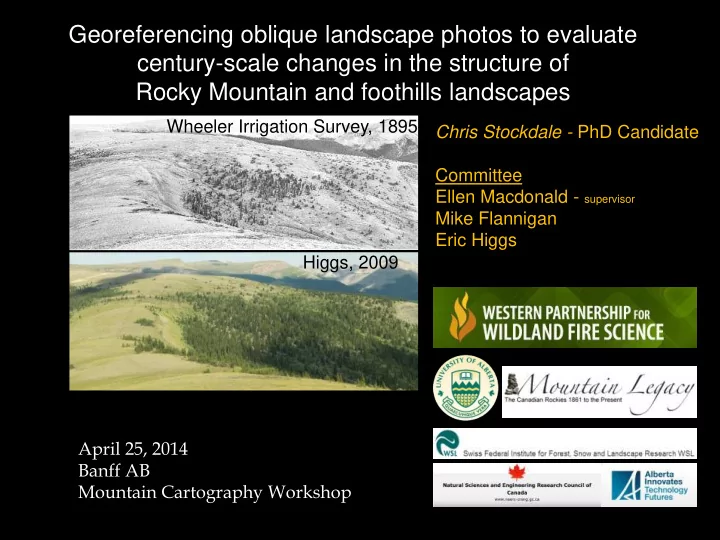

Georeferencing oblique landscape photos to evaluate century-scale changes in the structure of Rocky Mountain and foothills landscapes Wheeler Irrigation Survey, 1895-1897 Chris Stockdale - PhD Candidate Committee Ellen Macdonald - supervisor Mike Flannigan Eric Higgs Higgs, 2009 April 25, 2014 Banff AB Mountain Cartography Workshop
History
Planning for the future without knowledge of the past is inherently riskier than the alternative. “We are more likely to use the present to attempt to reconstruct the past, than we are to use the past to understand the present and guide the future.” - Stephen Pyne
From: Swetnam et al. 1999. Applied Historical Ecology: Using the past to manage for the future
FOREST MANAGEMENT From: Swetnam et al. 1999. Applied Historical Ecology: Using the past to manage for the future
1939 – southern Alberta MLP Canada-wide aerial photography 1949 1885 Higgs, 2009 Wheeler 1895
1939 – southern Alberta MLP Canada-wide aerial photography 1949 1885 Higgs, 2009 Wheeler 1895
Requirements? Photographs taken at nadir • • Every pixel = same area* • Lots of software tools available 1949 Higgs, 2009 Wheeler 1895
Rubbersheeting Can’t interpret vegetation after georeferencing
Bridgland, 1913
Digital Monoplotting for Georeferencing Oblique Photography From: C. Bozzini, M. Conedera, P. Krebs 2012. A New Monoplotting Tool to Extract Georeferenced Vector Data and Orthorectified Raster Data from Oblique Non-Metric Photographs. International Journal of Heritage in the Digital Era
ACCURACY TEST 1. 8 images used 2. 21 control points established in each image 3. 6 Anchor Points used to georeference the image 4. Remaining 15 control points (TEST points) are georeferenced in Monoplotting tool 5. Locations compared to Control Point
ACCURACY TEST 1. 8 images used 2. 21 control points established in each image 3. 6 Anchor Points used to georeference the image 4. Remaining 15 control points (TEST points) are georeferenced in Monoplotting tool 5. Locations compared to Control Point
Polygon based approach 1. Raster based approach 2. Hybrid polygon/raster 3.
Classify vegetation in plots in Monoplotting Tool NOTE: Oblique view, MLP image
Export spatially referenced objects to ArcGIS (or other GIS) NOTE: Orthogonal view in GIS
NOTE: Orthogonal view in GIS overlain on Orthophoto of same time as MLP image
MLP image
Ortho image of same region
Viewshed Analysis of image showing what part of landscape is visible in photograph
Insert spatially referenced grid in Visible landscape 30m grid
30 m Export spatially referenced 30 m grid to Monoplotting tool 30 m for classification of 2009 30 m image 30 30 m 30 m 30 m 30 m 30 m 30 m 30 m 30 m
1899 image with grid
1899
1899 2009
Table 1: Vegetation Transition Matrix Initial Grass Shrub Decid. Mixed Conif er Final Grass 0 -1 -2 -3 -4 Shrub 1 0 -1 -2 -3 Deciduous 2 1 0 -1 -2 Mixed 3 2 1 0 -1 Conifer 4 3 2 1 0
Table 1: Vegetation Transition Matrix Initial Grass Shrub Decid. Mixed Conif er Final Grass 0 -1 -2 -3 -4 Shrub 1 0 -1 -2 -3 Deciduous 2 1 0 -1 -2 Mixed 3 2 1 0 -1 Figure 1: Raster “change” surface Conifer 4 3 2 1 0
Put plots on landscape 250m 250m 250m 250m 250m 250m
Is 1913 more variable than 2009? Patch sizes, edge to interior, # of patches, fractal dimension, contagion, TPSA Has the leading tree species of the forest changed? Where? Is this to more or less advanced successional species? 1913 Note: Mock classified imagery 2009 Is the forest more dense (stem density) in 2009 than 1913? Where is this observed? What were the original conditions? Is the age class distribution of the forest older and more homogenous?
Primary Funding Sources Additional Funding Sources In-Kind Support
• Bridgland 1912-1913 • Wheeler 1895-1899 • Total 1462 Image pairs
5 km viewshed from all photos Choose area with extensive view coverage
Beaver Mines West Castle Castle Waterton Lakes NP
Recommend
More recommend